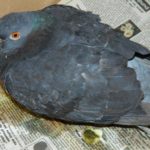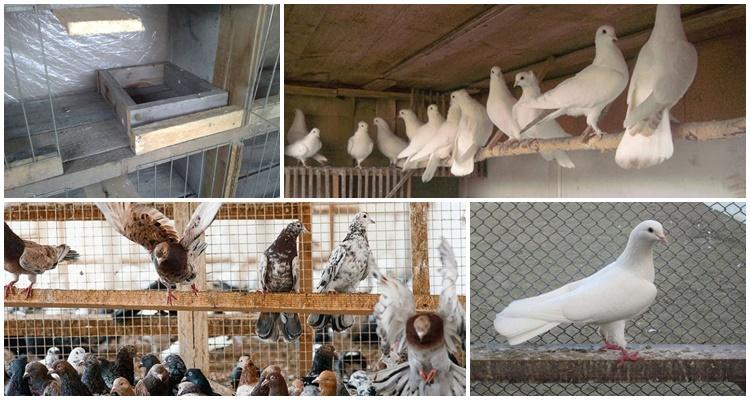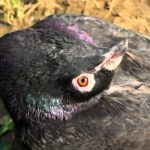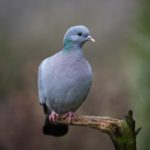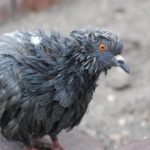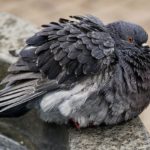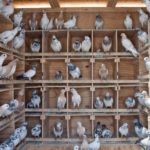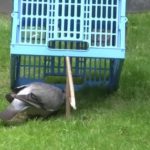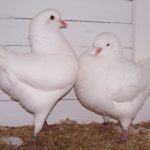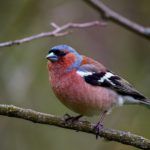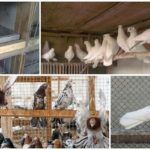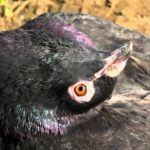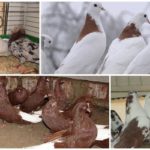Coccidiosis is a contagious disease of birds that affects the intestines. Its walls are affected; without treatment, many birds die. Once an infection appears in a poultry house, the entire flock can become infected. Let's look at the causes of coccidiosis in pigeons, symptoms and treatment. How to identify it by its characteristic signs and prevent this infectious disease in the household.
What kind of disease is this?
Coccidiosis affects many species of birds, both domestic and wild. For example, pigeons can become infected from chickens and turkeys. It mainly affects chicks and young animals.Pigeons that are less than 3 weeks old and adult birds rarely get sick. The entire flock can become infected if the birds have not been sick before and have not developed immunity.
Coccidiosis in pigeons occurs in subclinical (asymptomatic) and acute forms. In the first case, a small number of protozoa enter the bird's body. A healthy immune system suppresses them, and a serious form of intestinal disease does not develop. The acute form is typical for young animals.
How does infection occur?
Humidity and heat promote the spread of coccidiosis. Its causative agents are protozoa, coccidia of the genus Eimeria, kept in dirty litter in an unventilated room. They end up there with the droppings of sick pigeons. Once in the body, the protozoa begin to multiply and damage the intestines. Coccidia are found in droppings that get into food and water and are spread by animals and even people.
Symptoms of the disease
The incubation period for coccidiosis in pigeons lasts 6-8 days. Infected pigeons become apathetic, lethargic, sit on the perch a lot, ruffled, with ruffled feathers, and eat poorly. When flying and walking, movement coordination is impaired. A sign of coccidiosis is mucous diarrhea, in which blood appears over time. Due to insufficient supply of nutrients and loss of water and microelements during diarrhea, birds lose weight; in advanced cases, death occurs from dehydration and exhaustion.
The disease progresses slowly. Adult pigeons, without signs of disease, can be carriers of protozoa and spread them, although they develop immunity.However, even in this case, they can become infected again, but their coccidiosis is asymptomatic.
Diagnostic methods
Coccidiosis is diagnosed by microscopic examination of the intestinal contents of sick birds or by the appearance of the intestines of dead birds. White plaques are visible on its walls - accumulations of protozoa.
Rules for treating coccidiosis in pigeons
Coccidiosis is contagious, therefore, to prevent a sick individual from infecting healthy ones, it is isolated. Sick birds are given coccidiostats - special drugs for this disease. Coccidiostats are also given to healthy pigeons for prevention. The drugs are added to food or water. Examples of drugs for coccidiosis: Baycox, Zoalin, Furagin, Coccidin. They work best at the initial stage of the disease. Coccidiostats are given to pigeons for several days in a row, at the dose recommended in the instructions for use.
Coccidiostatics are safe for pigeons; they can be given even during the period of breeding, adaptation and molting, when the load on the bird’s body increases. Drugs are prescribed only after an accurate diagnosis has been made, and sometimes re-treatment is carried out. Complete recovery of the birds occurs when no coccidia oocysts are detected during laboratory tests.
Due to the fact that the drugs partially destroy the beneficial microflora in the intestines, after completion of therapy, pigeons need to be given vitamin supplements, probiotics, and fish oil.
Preventive actions
If an infection is detected in part of the livestock, preventive watering of the entire flock is carried out. Pigeons are released for walks in order to strengthen the immune system. Carry out thorough cleaning of droppings and disinfection of the poultry house, floor, perches and equipment, and nests.To do this, use bleach and hot soda solution. Coccidia is excellent at destroying fire, so it is recommended to treat the poultry house and equipment with a blowtorch fire.
Dampness and elevated temperatures should not be allowed in the dovecote; for protozoa, these are the best conditions for reproduction. Since they are excreted in the droppings of sick birds, it is necessary to frequently change the bedding, clean the perches, wash and scald feeders and drinkers with boiling water. Pigeons should not be allowed to drink water from puddles or other inappropriate sources. Food should be stored in a place where rodents cannot enter.
For pigeons purchased from other farms, you need to organize a quarantine: put them in a separate cage located away from the dovecote. Its duration is 2 weeks. At this time, it is advisable to treat them with coccidiostats. Preventive feeding of the entire livestock with drugs should begin a month before the start of the breeding season.
Most cases of infectious diseases are recorded in those farms where proper attention is not paid to hygienic measures. The bird is kept in an uncleaned room that is damp, dirty and hot. Once the diagnosis is confirmed, pigeons need to be treated immediately.
You can cure birds yourself; the main coccidiostats are affordable and can be purchased at any veterinary pharmacy. The drugs are harmless to birds even when the dose is 10 times higher, do not cause complications or side effects, and do not interfere with the formation of immunity to the disease. Compatible with other medications, feed additives, and vitamins.


